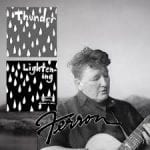Off the beaten path – Joel Frederiksen and Wu Man’s acoustic excursions
Two new CDs from Germany and the Central Asian Silk Road challenge our ideas of what ‘roots music’ is
REQUIEM FOR A PINK MOON – an Elizabethan tribute to Nick Drake
By Joel Frederiksen
During his short lifetime, the British singer and songwriter, Nick Drake – like his contemporary Jimi Hendrix – only recorded three studio albums and also like the guitarist his music has become more and more influential as time has passed.
While he was alive, Nick Drake was hardly a household name and the audience for his lovely, dark and introspective melodies was a small one. And, while it’s true that the passage of time can rectify all things, it’s a pity that time is never in a hurry and doesn’t recognize human frailty. Leonard Cohen, an artist whose tone and subject matter closely mirrors Drake’s has lived long enough to have a second coming in his art. Nick Drake and other ‘chroniclers of the interior landscape’ like Tim Buckley did not. It took decades from the time Drake committed suicide and Buckley died of a heroin overdose, for their music to receive the recognition that had eluded them in life. And, even though it’s pointless to speculate, one can’t help but wonder if they would still be around today if their music had been more appreciated at the time it was created.
Still, the romantic in Drake – if he’s watching all of this from somewhere – must be elated at the critical acclaim he’s received in the last decade or two. Many artists including Lucinda Williams, Sebadoh and Norah Jones have all recorded wonderful versions of some of his songs, and his original recordings have been used extensively in television, movies and advertisements in recent years. Yet, of all the attention paid to his music, ‘Pink Moon’, a new collection of Nick Drake’s songs recorded by Joel Frederiksen, an acclaimed German classical lute player and vocalist may very well be the most interesting reflection we’ve had of his work to date.

Altogether, the disc features interpretations of thirteen of Nick Drake’s songs interspersed with eleven Elizabethan lute pieces. Before hearing ‘Requiem for a Pink Moon’, I had never heard of Joel Frederiksen, but now I will make a point of searching for more of his music. At first, I found his deeply resonant classically trained voice took a little getting used to – roots music is rarely annunciated so carefully and precisely – but after one or two listens through the disc, I began to appreciate how his vocals perfectly matched his instrumentation. The lute playing is superb throughout the record as Frederiksen doesn’t stray too far from Drake’s original melodies, but plays them with a confidence and depth that is wonderful to hear. ‘Requiem for a Pink Moon’ is a winner from beginning to end that both Drake and string enthusiasts of all types will profoundly enjoy.
Music of Central Asia Vol. 10 Borderlands – Wu Man and Master Musicians from the SILK ROUTE – CD/DVD set

Central Asian music is folk music in the same way Appalachian music is folk music. It is primarily comprised of songs and melodies that express the every day lives of the people who sing them. The music featured on ‘Borderlands’ is primarily drawn from the traditional repertoires of nomadic people in the region and as such is full of myth and legend, superstition and the fear of God in the same way that much of our early music was. The Silk Road trading routes that this music came from passed through Persia, Afghanistan, Mongolia, Tibet and China and was every bit as lawless and untamed as our own ‘wild west’ was. It was a meeting place of cultures and religions from Buddhism, to Islam and Christianity and the music on this disc reflects that by drawing on music from several traditions.
The music on ‘Borderlands’ was lead and curated by Wu Man, a Chinese pipa player who has been researching music from the region for many years. A pipa is like a short pear shaped lute and has been played extensively in Asia for more than 1500 years. The music is not pretty in a conventional sense; it sometimes sounds harsh and unpolished in its beauty – completely unlike Joel Frederiksen’s playing on the Drake tribute – but like a wild and brash Dock Boggs solo, it is surprisingly easy to get into.

The greatest thing about ‘Borderlands’ and every other disc in the Smithsonian Folkways Music of Central Asia series is that one doesn’t need to be a musicologist to enjoy them. After the first listen, I put down the liner notes and let the music work its magic all on its own. The beautifully shot DVD that accompanies the music offers a fantastic journey through Central Asia that features helpful explications of the traditions the music arose out of as well as wonderful videos of some of the performances. Very much worth checking out!
Reviews by Douglas Heselgrave
This posting also appears at www.restlessandreal.blogspot.com
Sign up for free updates




